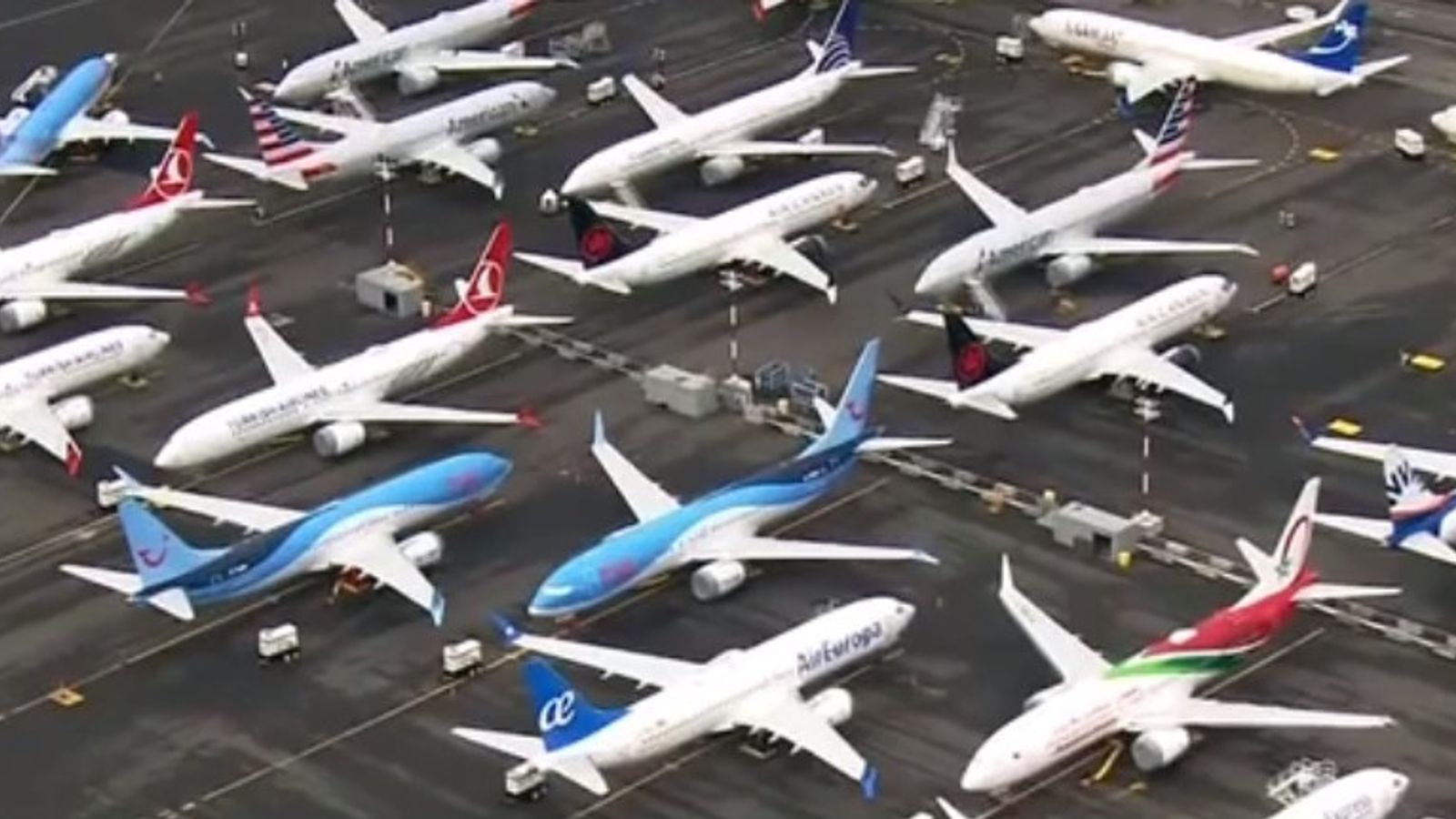Boeing to halt production of crisis-hit 737 MAX in January
Boeing is temporarily halting production of the grounded 737 MAX aircraft.
The US aerospace firm said it would stop making the jet in January.
The decision was widely seen as a humiliating admission that the fleet's fate lies in the hands of regulators after its own timetable to return the planes to service dragged by months.
The Federal Aviation Administration (FAA) said last week it would not grant clearance before 2020.
All versions of the 737 MAX were grounded worldwide in March - days after an Ethiopian Airlines plane came down outside Addis Ababa, and five months after a Lion Air flight suffered a similar fate near Indonesia.
A total of 346 people died in the crashes.
Boeing has been working with US regulators to ensure the planes are safe - with modifications focusing on an anti-stall device called the Manoeuvring Characteristics Augmentation System (MCAS) in the hope of returning the 737 MAX to service.
The Federal Aviation Administration (FAA) is not now expected to grant clearance for US flights until January at the earliest, according to US officials.
European regulators would need to give their own approval, at a later date, with pilots also having to undergo re-training before 737 MAX commercial operations could resume within European airspace.
A statement from Boeing said: "Safely returning the 737 MAX to service is our top priority.
"We know that the process of approving the 737 MAX's return to service, and of determining appropriate training requirements, must be extraordinarily thorough and robust, to ensure that our regulators, customers, and the flying public have confidence in the 737 MAX updates.
"As a result of this ongoing evaluation, we have decided to prioritise the delivery of stored aircraft and temporarily suspend production on the 737 program beginning next month."
The company said it did not expect any job losses "at this time", leaving the company under pressure to save costs elsewhere as it grapples a growing bill - last put at $9bn (£6.8bn).
That sum is expected to rise significantly.
Boeing has continued to produce 737 MAX jets at around 42 per month, while also purchasing parts from suppliers at a rate of up to 52 units per month.
Deliveries have been frozen until regulators approve the aircraft to fly commercially again, leaving the company scrambling to find space to store hundreds of planes.
https://news.sky.com/story/boeing-temporarily-halts-production-of-737-max-11888578
The US aerospace firm said it would stop making the jet in January.
The decision was widely seen as a humiliating admission that the fleet's fate lies in the hands of regulators after its own timetable to return the planes to service dragged by months.
The Federal Aviation Administration (FAA) said last week it would not grant clearance before 2020.
All versions of the 737 MAX were grounded worldwide in March - days after an Ethiopian Airlines plane came down outside Addis Ababa, and five months after a Lion Air flight suffered a similar fate near Indonesia.
A total of 346 people died in the crashes.
Boeing has been working with US regulators to ensure the planes are safe - with modifications focusing on an anti-stall device called the Manoeuvring Characteristics Augmentation System (MCAS) in the hope of returning the 737 MAX to service.
The Federal Aviation Administration (FAA) is not now expected to grant clearance for US flights until January at the earliest, according to US officials.
European regulators would need to give their own approval, at a later date, with pilots also having to undergo re-training before 737 MAX commercial operations could resume within European airspace.
A statement from Boeing said: "Safely returning the 737 MAX to service is our top priority.
"We know that the process of approving the 737 MAX's return to service, and of determining appropriate training requirements, must be extraordinarily thorough and robust, to ensure that our regulators, customers, and the flying public have confidence in the 737 MAX updates.
"As a result of this ongoing evaluation, we have decided to prioritise the delivery of stored aircraft and temporarily suspend production on the 737 program beginning next month."
The company said it did not expect any job losses "at this time", leaving the company under pressure to save costs elsewhere as it grapples a growing bill - last put at $9bn (£6.8bn).
That sum is expected to rise significantly.
Boeing has continued to produce 737 MAX jets at around 42 per month, while also purchasing parts from suppliers at a rate of up to 52 units per month.
Deliveries have been frozen until regulators approve the aircraft to fly commercially again, leaving the company scrambling to find space to store hundreds of planes.
https://news.sky.com/story/boeing-temporarily-halts-production-of-737-max-11888578





Post a Comment